Abstract
Mutations in the human phosphofructokinase muscle subunit gene (PFKM) are known to cause myopathy classified as glycogenosis type VII (Tarui disease). Previously described molecular defects include base substitutions altering encoded amino acids or resulting in abnormal splicing. We report a mutation resulting in phosphofructokinase deficiency in three patients from an Ashkenazi Jewish family. Using a reverse transcription PCR assay, PFKM subunit transcripts differing by length were detected in skeletal muscle tissue of all three affected subjects. In the longer transcript, an insertion of 252 nucleotides totally homologous to the structure of the 10th intron of the PFKM gene was found separating exon 10 from exon 11. In addition, two single base transitions were identified by direct sequencing: [exon 6; codon 95; CGA (Arg) to TGA (stop)] and [exon 7; codon 172; ACC (Thr) to ACT (Thr)] in either transcript. Single-stranded conformational polymorphism and restriction enzyme analyses confirmed the presence of these point substitutions in genomic DNA and strongly suggested homozygosity for the pathogenic allele. The nonsense mutation at codon 95 appeared solely responsible for the phenotype in these patients, further expanding genetic heterogeneity of Tarui disease. Transcripts with and without intron 10 arising from identical mutant alleles probably resulted from differential pre-mRNA processing and may represent a novel message from the PFKM gene.
Full text
PDF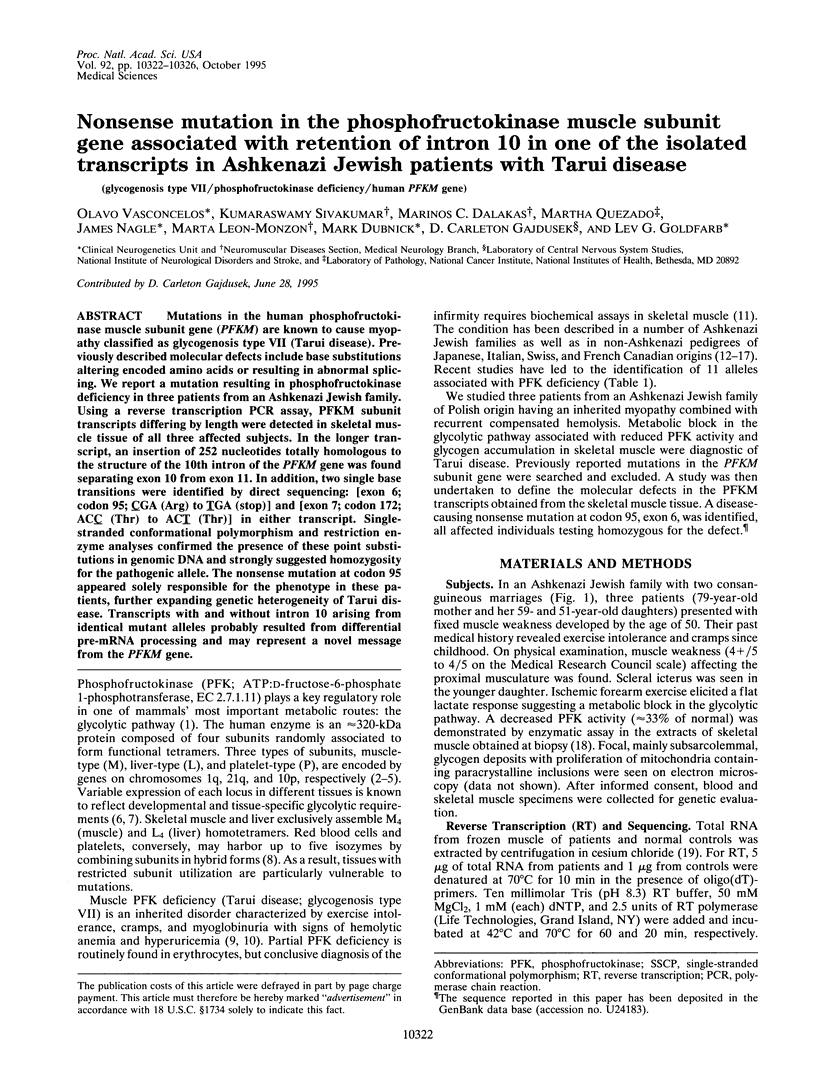
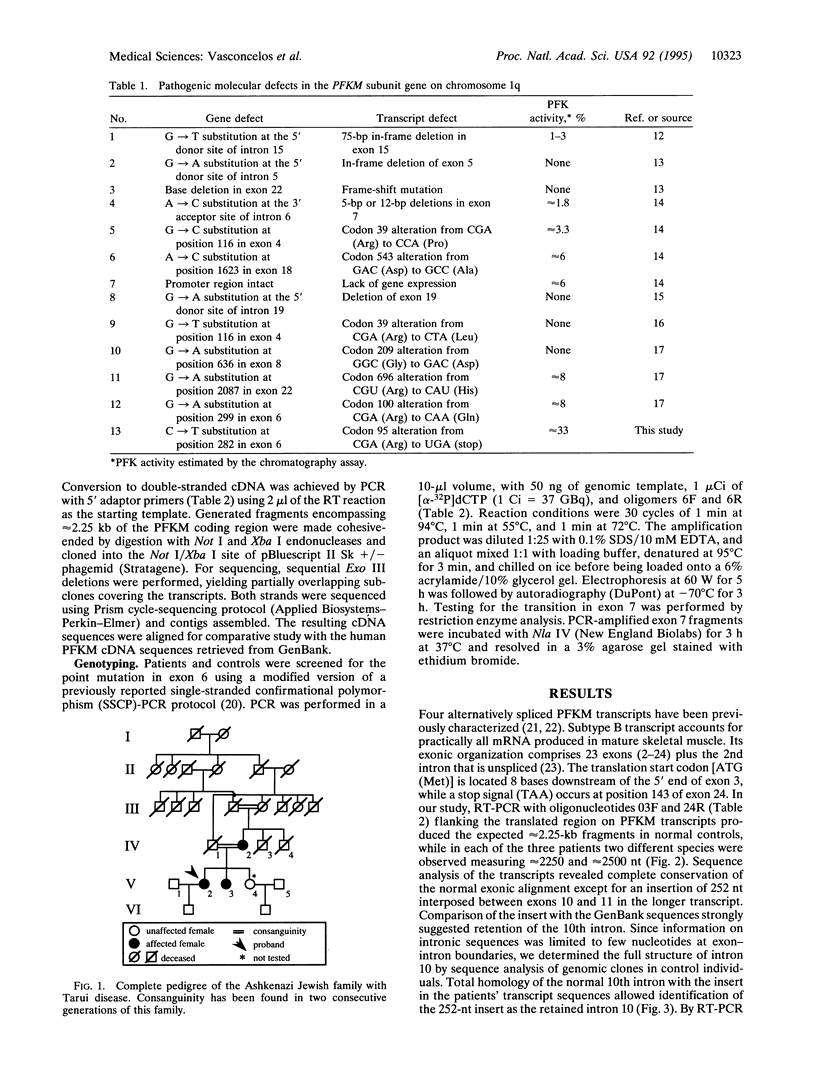
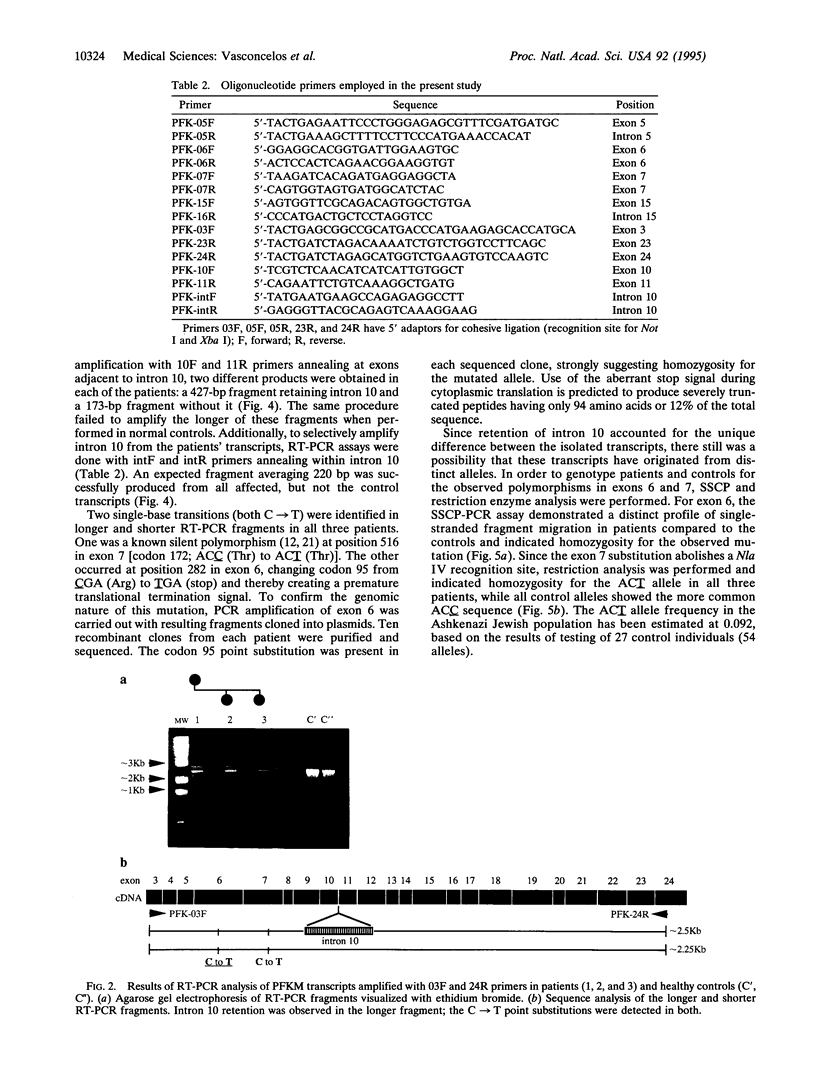
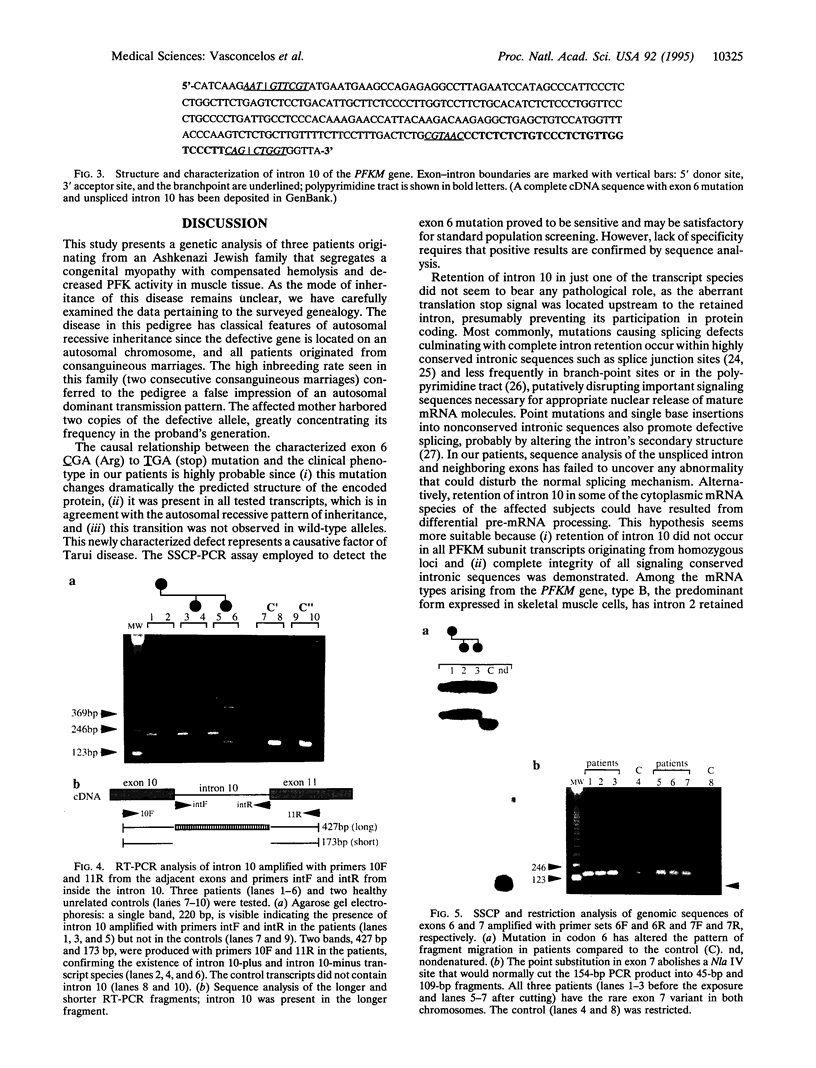
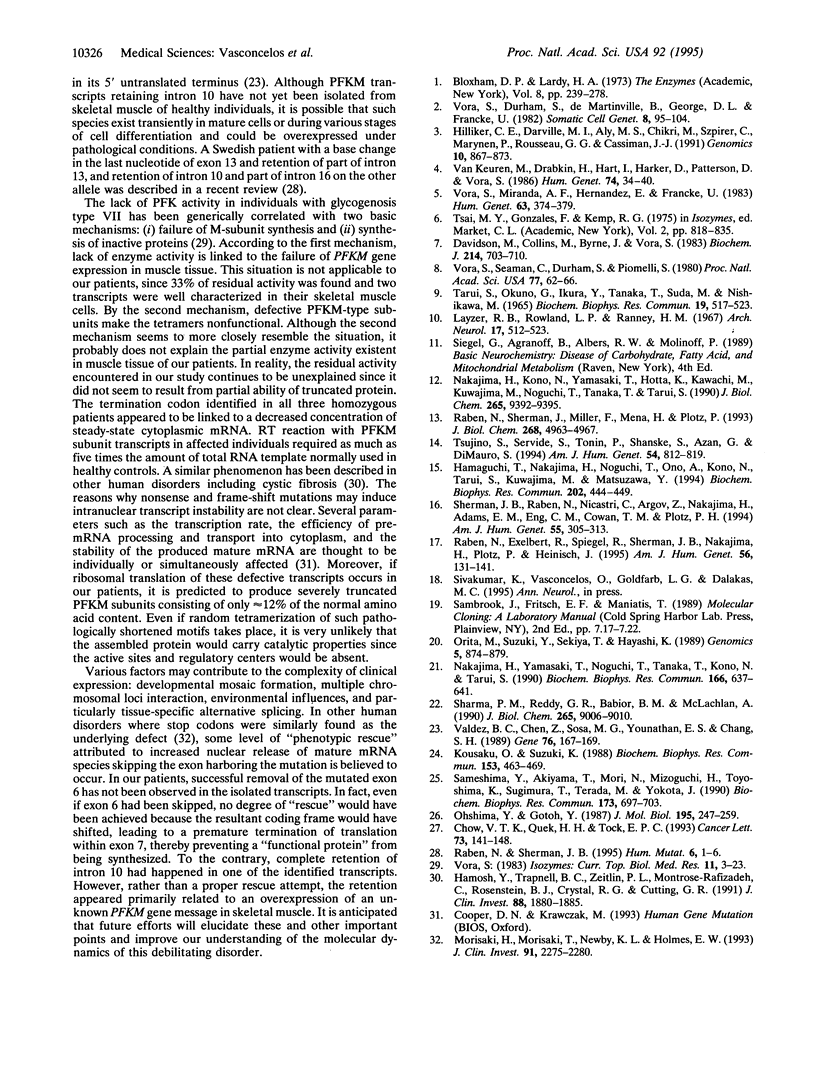
Images in this article
Selected References
These references are in PubMed. This may not be the complete list of references from this article.
- Chow V. T., Quek H. H., Tock E. P. Alternative splicing of the p53 tumor suppressor gene in the Molt-4 T-lymphoblastic leukemia cell line. Cancer Lett. 1993 Sep 30;73(2-3):141–148. doi: 10.1016/0304-3835(93)90256-9. [DOI] [PubMed] [Google Scholar]
- Davidson M., Collins M., Byrne J., Vora S. Alterations in phosphofructokinase isoenzymes during early human development. Establishment of adult organ-specific patterns. Biochem J. 1983 Sep 15;214(3):703–710. doi: 10.1042/bj2140703. [DOI] [PMC free article] [PubMed] [Google Scholar]
- Hamaguchi T., Nakajima H., Noguchi T., Ono A., Kono N., Tarui S., Kuwajima M., Matsuzawa Y. A new variant of muscle phosphofructokinase deficiency in a Japanese case with abnormal RNA splicing. Biochem Biophys Res Commun. 1994 Jul 15;202(1):444–449. doi: 10.1006/bbrc.1994.1948. [DOI] [PubMed] [Google Scholar]
- Hamosh A., Trapnell B. C., Zeitlin P. L., Montrose-Rafizadeh C., Rosenstein B. J., Crystal R. G., Cutting G. R. Severe deficiency of cystic fibrosis transmembrane conductance regulator messenger RNA carrying nonsense mutations R553X and W1316X in respiratory epithelial cells of patients with cystic fibrosis. J Clin Invest. 1991 Dec;88(6):1880–1885. doi: 10.1172/JCI115510. [DOI] [PMC free article] [PubMed] [Google Scholar]
- Hilliker C. E., Darville M. I., Aly M. S., Chikri M., Szpirer C., Marynen P., Rousseau G. G., Cassiman J. J. Human and rat chromosomal localization of two genes for 6-phosphofructo-2-kinase/fructose-2,6-bisphosphatase by analysis of somatic cell hybrids and in situ hybridization. Genomics. 1991 Aug;10(4):867–873. doi: 10.1016/0888-7543(91)90174-d. [DOI] [PubMed] [Google Scholar]
- Layzer R. B., Rowland L. P., Ranney H. M. Muscle phosphofructokinase deficiency. Arch Neurol. 1967 Nov;17(5):512–523. doi: 10.1001/archneur.1967.00470290066009. [DOI] [PubMed] [Google Scholar]
- Morisaki H., Morisaki T., Newby L. K., Holmes E. W. Alternative splicing: a mechanism for phenotypic rescue of a common inherited defect. J Clin Invest. 1993 May;91(5):2275–2280. doi: 10.1172/JCI116455. [DOI] [PMC free article] [PubMed] [Google Scholar]
- Nakajima H., Kono N., Yamasaki T., Hotta K., Kawachi M., Kuwajima M., Noguchi T., Tanaka T., Tarui S. Genetic defect in muscle phosphofructokinase deficiency. Abnormal splicing of the muscle phosphofructokinase gene due to a point mutation at the 5'-splice site. J Biol Chem. 1990 Jun 5;265(16):9392–9395. [PubMed] [Google Scholar]
- Nakajima H., Yamasaki T., Noguchi T., Tanaka T., Kono N., Tarui S. Evidence for alternative RNA splicing and possible alternative promoters in the human muscle phosphofructokinase gene at the 5' untranslated region. Biochem Biophys Res Commun. 1990 Jan 30;166(2):637–641. doi: 10.1016/0006-291x(90)90856-i. [DOI] [PubMed] [Google Scholar]
- Ohno K., Suzuki K. A splicing defect due to an exon-intron junctional mutation results in abnormal beta-hexosaminidase alpha chain mRNAs in Ashkenazi Jewish patients with Tay-Sachs disease. Biochem Biophys Res Commun. 1988 May 31;153(1):463–469. doi: 10.1016/s0006-291x(88)81247-6. [DOI] [PubMed] [Google Scholar]
- Ohshima Y., Gotoh Y. Signals for the selection of a splice site in pre-mRNA. Computer analysis of splice junction sequences and like sequences. J Mol Biol. 1987 May 20;195(2):247–259. doi: 10.1016/0022-2836(87)90647-4. [DOI] [PubMed] [Google Scholar]
- Orita M., Suzuki Y., Sekiya T., Hayashi K. Rapid and sensitive detection of point mutations and DNA polymorphisms using the polymerase chain reaction. Genomics. 1989 Nov;5(4):874–879. doi: 10.1016/0888-7543(89)90129-8. [DOI] [PubMed] [Google Scholar]
- Raben N., Exelbert R., Spiegel R., Sherman J. B., Nakajima H., Plotz P., Heinisch J. Functional expression of human mutant phosphofructokinase in yeast: genetic defects in French Canadian and Swiss patients with phosphofructokinase deficiency. Am J Hum Genet. 1995 Jan;56(1):131–141. [PMC free article] [PubMed] [Google Scholar]
- Raben N., Sherman J. B. Mutations in muscle phosphofructokinase gene. Hum Mutat. 1995;6(1):1–6. doi: 10.1002/humu.1380060102. [DOI] [PubMed] [Google Scholar]
- Raben N., Sherman J., Miller F., Mena H., Plotz P. A 5' splice junction mutation leading to exon deletion in an Ashkenazic Jewish family with phosphofructokinase deficiency (Tarui disease). J Biol Chem. 1993 Mar 5;268(7):4963–4967. [PubMed] [Google Scholar]
- Sameshima Y., Akiyama T., Mori N., Mizoguchi H., Toyoshima K., Sugimura T., Terada M., Yokota J. Point mutation of the p53 gene resulting in splicing inhibition in small cell lung carcinoma. Biochem Biophys Res Commun. 1990 Dec 14;173(2):697–703. doi: 10.1016/s0006-291x(05)80091-9. [DOI] [PubMed] [Google Scholar]
- Sharma P. M., Reddy G. R., Babior B. M., McLachlan A. Alternative splicing of the transcript encoding the human muscle isoenzyme of phosphofructokinase. J Biol Chem. 1990 Jun 5;265(16):9006–9010. [PubMed] [Google Scholar]
- Sherman J. B., Raben N., Nicastri C., Argov Z., Nakajima H., Adams E. M., Eng C. M., Cowan T. M., Plotz P. H. Common mutations in the phosphofructokinase-M gene in Ashkenazi Jewish patients with glycogenesis VII--and their population frequency. Am J Hum Genet. 1994 Aug;55(2):305–313. [PMC free article] [PubMed] [Google Scholar]
- TARUI S., OKUNO G., IKURA Y., TANAKA T., SUDA M., NISHIKAWA M. PHOSPHOFRUCTOKINASE DEFICIENCY IN SKELETAL MUSCLE. A NEW TYPE OF GLYCOGENOSIS. Biochem Biophys Res Commun. 1965 May 3;19:517–523. doi: 10.1016/0006-291x(65)90156-7. [DOI] [PubMed] [Google Scholar]
- Tsujino S., Servidei S., Tonin P., Shanske S., Azan G., DiMauro S. Identification of three novel mutations in non-Ashkenazi Italian patients with muscle phosphofructokinase deficiency. Am J Hum Genet. 1994 May;54(5):812–819. [PMC free article] [PubMed] [Google Scholar]
- Valdez B. C., Chen Z., Sosa M. G., Younathan E. S., Chang S. H. Human 6-phosphofructo-1-kinase gene has an additional intron upstream of start codon. Gene. 1989 Mar 15;76(1):167–169. doi: 10.1016/0378-1119(89)90019-x. [DOI] [PubMed] [Google Scholar]
- Van Keuren M., Drabkin H., Hart I., Harker D., Patterson D., Vora S. Regional assignment of human liver-type 6-phosphofructokinase to chromosome 21q22.3 by using somatic cell hybrids and a monoclonal anti-L antibody. Hum Genet. 1986 Sep;74(1):34–40. doi: 10.1007/BF00278782. [DOI] [PubMed] [Google Scholar]
- Vora S., Durham S., de Martinville B., George D. L., Francke U. Assignment of the human gene for muscle-type phosphofructokinase (PFKM) to chromosome 1 (region cen leads to q32) using somatic cell hybrids and monoclonal anti-M antibody. Somatic Cell Genet. 1982 Jan;8(1):95–104. doi: 10.1007/BF01538653. [DOI] [PubMed] [Google Scholar]
- Vora S. Isozymes of human phosphofructokinase: biochemical and genetic aspects. Isozymes Curr Top Biol Med Res. 1983;11:3–23. [PubMed] [Google Scholar]
- Vora S., Miranda A. F., Hernandez E., Francke U. Regional assignment of the human gene for platelet-type phosphofructokinase (PFKP) to chromosome 10p: novel use of polyspecific rodent antisera to localize human enzyme genes. Hum Genet. 1983;63(4):374–379. doi: 10.1007/BF00274765. [DOI] [PubMed] [Google Scholar]
- Vora S., Seaman C., Durham S., Piomelli S. Isozymes of human phosphofructokinase: identification and subunit structural characterization of a new system. Proc Natl Acad Sci U S A. 1980 Jan;77(1):62–66. doi: 10.1073/pnas.77.1.62. [DOI] [PMC free article] [PubMed] [Google Scholar]





